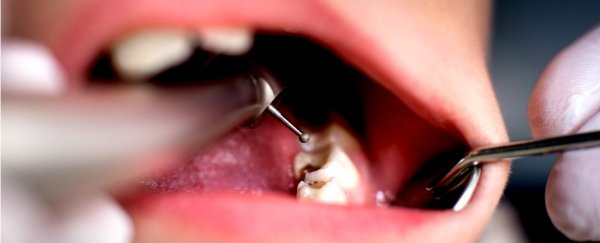If risking cavities and losing teeth wasn't enough of an incentive to floss and brush properly, new research adds evidence that poor dental habits might also be bad for your lungs.
Potentially dangerous changes in mouth microflora have been found to make their way down the respiratory tract, potentially explaining an increased risk of pneumonia in elderly people with bad oral hygiene.
Previous studies had already indicated that clean teeth meant clean lungs, at least among the aged residents of hospitals and nursing homes.
Microbes in saliva that's breathed in (aspirated) were the most likely source of pneumonia, but the identities of the top offenders were yet to be determined.
Epidemiologist Yoshihisa Yamashita from Kyushu University in Japan led a team with the intention of scraping up samples of these potentially threatening microbes and learning their names.
They modified an electric toothbrush into a street-sweeper for the tongue and collected material from the mouths of 506 septuagenarians in the Japanese town of Hisayama during a routine health check-up.
With the tongue scrapings and details of the volunteer's dental state, the team could count and categorise the microbes based on their genes and match them with characteristics such as tooth decay and gingivitis.
"Commensal microbiota composition, especially the relative abundances of predominant commensals, showed an association with tooth conditions," says Yamashita.
They found two predominant groups of bacteria. One contained species that included Prevotella histicola, Veillonella atypica, Streptococcus salivarius, and Streptococcus parasanguinis.
It's okay if none of those sound familiar to you. What you do need to know is that they're associated with an increased risk of dying from pneumonia. Previous research had also identified this group as more common among the elderly.
But that's not all.
"This bacterial group was more predominant in the elderly with fewer teeth, a higher plaque index, and more dental caries-experienced teeth," says Yamashita.
There were also more fungi growing in the mouths of older residents with signs of poorer dental hygiene.
To get the caveats out of the way, it's possible that there's more going on than just a lack of flossing.
While the volunteers all received a fairly comprehensive health check, there wasn't a survey detailing their health history or habits. So it's possible, if unlikely, that something else could have altered the groups of microbes in their mouths, something that also increased their risk of mortality from pneumonia.
Taken in context with other research, though, it's fair to say if we don't look after our teeth, we run the risk of a number of conditions that seem to have nothing to do with our mouths.
This isn't just about a greater risk of dying from pneumonia, but a slightly increased chance of developing a heart condition as well.
Like we need any more reasons to brush twice a day, eat healthy, floss, and give up smoking.
Yamashita also has advice for health practitioners. "Careful attention should be given to the tongue microbiota status in elderly adults with poorer dental conditions."
Our relationship with our body's microflora has been the focus of a great deal of investigation in recent years. It's clear that our health is tightly bound with the precise make-up of fungi, viruses, and bacteria that populate our entire digestive system.
Looking after them should be a priority. Especially if we hope they'll continue to look after us in our old age.
This research was published in mSphere.
